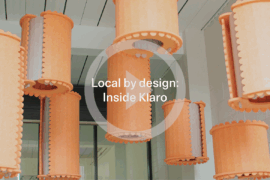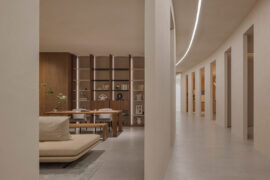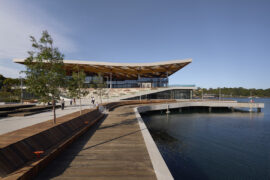Yolngu Elders and Communities with Kaunitz Yeung Architecture have designed a place of influence, where healthcare can be delivered through form, function and flexibility.

May 28th, 2024
Located in Nhulunuy, Yolngu Country in East Arnhem Land in Australia’s Northern Territory, the Yujuwala Djiwarr – Nhulunbuy Flexible Aged Care Facility by Yolngu Elders and Communities with Kaunitz Yeung Architecture is making a real difference and providing a special place for the elderly of the district.
East Arnhem Land covers an area of 97,000 kilometres with a population of 16,000 people, including 12,000 Yolngu who are some of the most traditional Aboriginal people in Australia. As the very first aged care project in this area of Australia, it was designed in deep collaboration with prospective residents, Yolngu Elders, families and organisations.

Roughly translated, Yujuwala Djiwarr means ‘Little Heaven’ and this centre provides the comfort for clients in their final time on earth. The facility comprises 32 beds for aged care, one palliative care bed and four dialysis chairs. The design is intentionally aimed at de-institutionalising a traditional hospice, with, for example, no corridors in the resident areas.
All beds have three views to the outside landscape and the rooms have been arranged as palm fronds separated by gardens and verandas. This is not a conventional arrangement as it results in longer travel distances to outward-bound rooms where twin rooms are divided into two single rooms. However, this design approach enables cross-ventilation, natural light, multiple outdoor spaces and visual connection to Country in multiple directions, while also complying with the regulations.

The series of buildings are reduced in scale and this helps integrate the structures into the landscaping. The buildings have been clad with 20 linear kilometres of timber salvaged from a local mine site, and was then milled locally by the Aboriginal-owned and -operated Gumati Corporation.
The timber batten facade also serves to ventilate and shade the buildings, while there is rooftop solar to help minimise offsite energy consumption. The design also includes deep verandas to allow for family to stay and also provides different orientations for various habitation throughout the year.

Landscaping is an integral part of the design and is culturally appropriate. Most of the plants were propagated by Yolngu in the local community nursery from seed collected from Country, providing a valuable co-construction element to the project. All plants have cultural meaning, whether for cultural practice, food or other use. Within the landscape, men’s and women’s bungal grounds (ceremonial grounds) are also integrated into the site.
There was much collaboration and input to the concept and design from prospective residents and their families which was overlaid with a broader cultural knowledge from key Elders.

Yujuwala Djiwarr – Nhulunbuy Flexible Aged Care Facility walks in ‘two worlds.’ It is the purposeful design embodiment of an approach which seeks to unite the ancient knowledge and experience of the Yolngu culture with the requirements and technology and experience of contemporary Australia. The participatory design process for this project took more than three years across the vast areas of Yolngu Country. It was an engagement which enabled a new approach for aged care to be developed. It was the voice of the Elders and their families which validated the out of the box thinking and deviations from the usual aged care guidelines. Time and repetition were key factors in this with the design slowly and patiently emerging.
As a place, Nhulunbuy is located 1042 kilometres of mostly dirt road from the nearest city, Darwin. It is cut off for six months of the year by the wet season flooding and then only accessible by a one-hour plane flight. It is fitting and right that Elders have a place that is specifically designed for them and for Country in their final days of life, and Kaunitz Yeung Architecture has not only provided this but also developed a new template for aged care living.
Yujuwala Djiwarr – Nhulunbuy Flexible Aged Care Facility by Yolngu Elders and Communities with Kaunitz Yeung Architecture is an entry in The Influencer in the 2024 INDE.Awards and this category is proudly partnered by KFive Furniture.
Kaunitz Yeung Architecture
kaunitzyeung.com
Photography
Brett Boardman









INDESIGN is on instagram
Follow @indesignlive
A searchable and comprehensive guide for specifying leading products and their suppliers
Keep up to date with the latest and greatest from our industry BFF's!

Now cooking and entertaining from his minimalist home kitchen designed around Gaggenau’s refined performance, Chef Wu brings professional craft into a calm and well-composed setting.

In an industry where design intent is often diluted by value management and procurement pressures, Klaro Industrial Design positions manufacturing as a creative ally – allowing commercial interior designers to deliver unique pieces aligned to the project’s original vision.

Milliken’s ‘Reconciliation Through Design’ initiative is amplifying the voices of Aboriginal and Torres Strait Islander artists, showcasing how cultural collaboration can reshape the design narrative in commercial interiors.

Designed by Woods Bagot, the new fit-out of a major resources company transforms 40,000-square-metres across 19 levels into interconnected villages that celebrate Western Australia’s diverse terrain.

The Simple Living Passage marks the final project in the Simple World series by Jenchieh Hung + Kulthida Songkittipakdee of HAS design and research, transforming a retail walkway in Hefei into a reflective public space shaped by timber and movement.
The internet never sleeps! Here's the stuff you might have missed

Knoll unveils two compelling chapters in its uncompromising design story: the Perron Pillo Lounge Chair and new material palettes for the Saarinen Pedestal Collection.

Signalling a transformative moment for Blackwattle Bay and the redevelopment of Sydney’s harbour foreshore, the newly open Sydney Fish Market demonstrates how thoughtfully designed public realm and contemporary market space can unite to create a landmark urban destination.